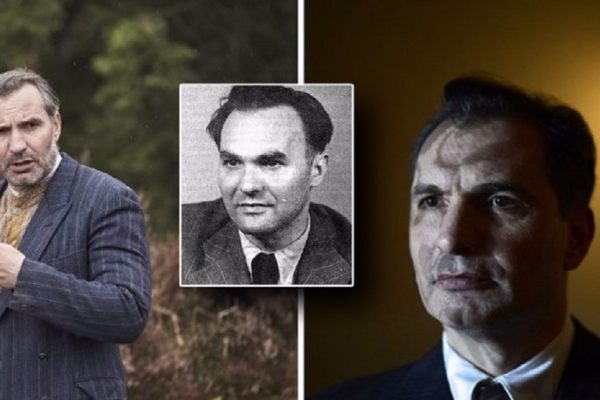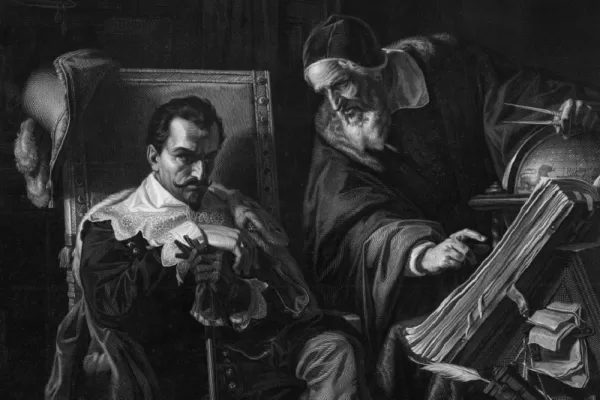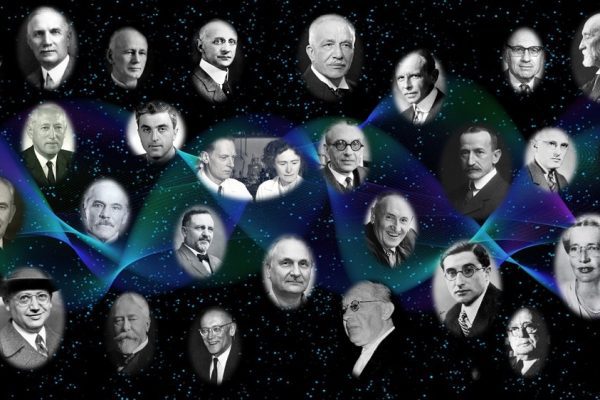Let’s travel back in time to 1919 and set our attention to the words of Doctor Jan Herben (in Czech) which are translated by Elsie Havlasa for the purpose of learning more about Tomáš Garrigue Masaryk. The following text is from a booklet which was written by Doctor Jan Herben and translated by Elsie Havlasa. It is entitled President of the Czecho-Slovak Republic, Thomas G. Masaryk, and comes to us from the Great Czecho-Slovaks series, published in 1919 by the Czecho-Slovakian Foreigner s’ Office.
(Yes, we realize that it is no longer called the Czecho-Slovak Republic but we did not want to change the title of the publication.)
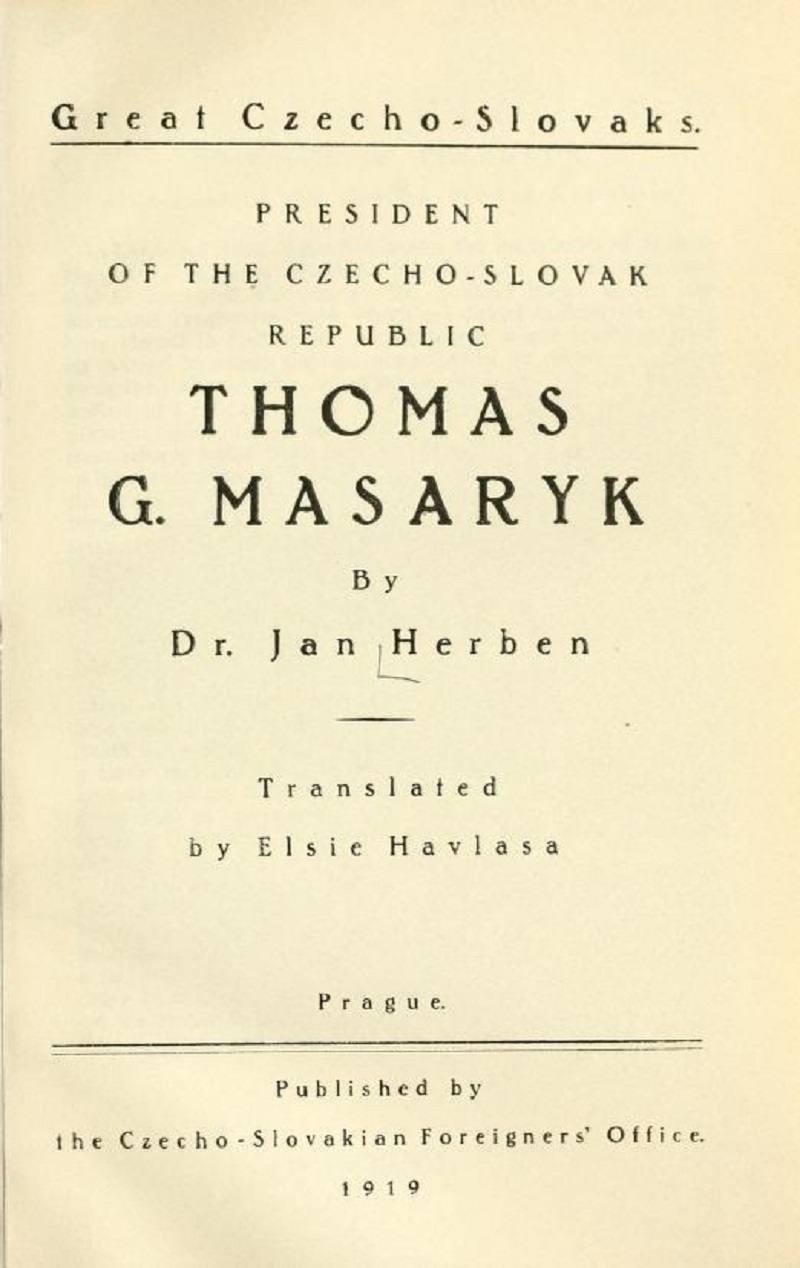
In December 1914, there fled across the boundaries of Austria-Hungary a university professor, about whom it was rumored that he corrupted the young; the political leader of the not numerous Progressive Party, whom no district in Bohemia would have elected to Parliament; a philosopher whose teachings were an evangel to some, but an abomination to most; a scholar recognized abroad who, nevertheless, at home was a member neither of the Academy nor of the Learned Society — a man of disputed significance it was who fled. In December 1918, this man returns home from exile in triumph as the first president of the Czecho-Slovak Republic, the sound of whose name thrills the hearts of the whole nation, from the borders of Bavaria to those of Romania — whose name calls forth exultation and tears; in favor of whose election as head of the state the whole National Assembly arose with cheers as one man, all parties without exception; and for whose coming the whole Czecho-Slovak Republic is decorating itself with flying banners in every village and solitude. The significance of Masaryk’s personality today is undisputed and omnipresent.
T. G. Masaryk made his appearance in Bohemia at an unpropitious time. He was a new man. Dissimilar to all who at that time were active in public affairs. Wherever he stepped in, he found opposition. Many years did not pass before he became a factor that could not be disregarded in public affairs. It was necessary to go with him or against him, it was not possible to avoid him or go around him and remain indifferent. Every thinking Czech had to balance accounts with Masaryk, because Masaryk was a live problem, a new program.
Masaryk was born on March 7, 1850, in the Moravian border town Hodonín. His father was a coachman on an imperial estate. Thomas’s childhood was restless and varied, because his parents lived in a different village almost every other year. His father was a native of Kopčany in Slovakia, then Hungarian, and his mother came from a somewhat Germanized family of Hustopeče, a town on the Moravian plains. At home Thomas learned Czech and a little German and went to a Czech school in Čejkovice. There he sometimes acted as ministrant in church, and was the star-pupil in school; when the dean had conferred his approbation upon the boy several times it did not require much urging to get his parents to send him to the lower Realschule in Hustopeče (German, of course, because at that time there was no Czech high-school in Moravia).
He absolved the first and second years there, which were necessary to enable the student to enter normal school. Thomas was to be a teacher. But when he had completed those two grades of Realschule, Thomas was only thirteen years old, and the normal school accepted no pupils under sixteen. For this reason, he became helper to the teacher in the school of Hodonín; among other things he taught music. But his parents grew tired of this long waiting and found Thomas a trade. His mother took him to Vienna to a family in which she had once been employed and which supported itself with a “Kunstschlosserei”, — which in reality, was an ordinary locksmith’s trade.
Thomas did not endure it long there, because it wearied him to do nothing but stand all the time by a machine, and besides the other apprentices kept taking away his books, particularly his atlas, which were his only joy. He became homesick and returned to his parents to Čejč. There he took up another trade. He was sent to be taught by the blacksmith on the estate and wished to follow this occupation. But upon the expostulations of his former teacher in Hustopeče, his parents decided to have Thomas prepare himself to be a teacher after all. For the second, time, therefore, he began to help out in school, this time in Čejkovice. There was not much teaching to be done, because only those attended school who wished to do so; the young assistant went to funerals, sang, attended to the village bell-turret, and inasmuch as after all he was desirous of knowledge, learned French. At the close of the school-year of 1865, upon the urgency of the local chaplain, Thomas passed the entrance examination to the second grade of gymnasium and began to study in Brno.
At the gymnasium of Brno (German, of course), Thomas Masaryk distinguished himself in all directions. In spite of the fact that he supported himself, like all poor students, by giving lessons, he acquitted himself of his studies with honors and besides privately learned Polish so well that he used to write his Czech compositions also in Polish. He remained in Brno, however, only till he had completed the sixth form. He was given to understand by the professors’ staff that he should leave. He was a restless spirit and often had conflicts, both of a philological and disciplinary nature, with the professors, but especially about religion. He refused to go to confession and called the principal of the school a contemptible wretch for admonishing him with the words: “To confession you must go. I do not believe in it either, but I am an official and must do my duty.”
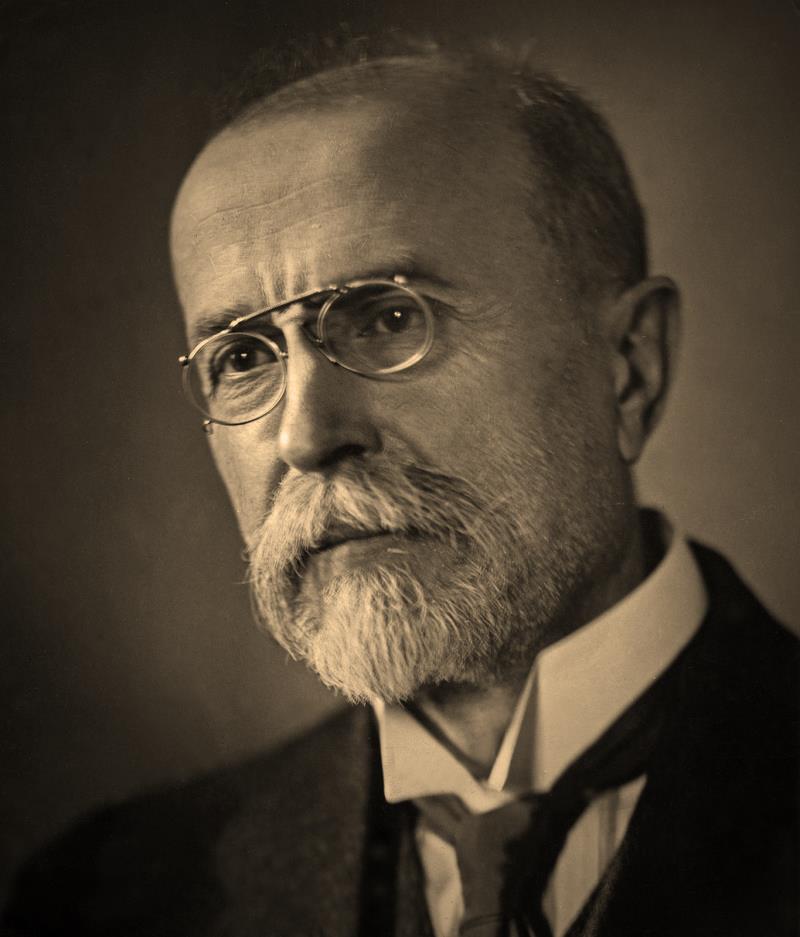
Thomas Masaryk had to seek his fortune elsewhere, in Vienna. There he graduated from gymnasium with honors and besides by that time knew Russian well enough to tutor the children of a Russian family in Russian. In Vienna he also graduated from the university, took his doctor’s degree, and became a docent of the university. Between taking his degree and becoming a docent he spent a year in Leipzig, where he became acquainted with Miss Charlotte Garrigue, later his wife; to bring her back from her parents, he went over to America in 1878. When in 1882 the University of Prague was divided into two parts, a Czech and a German, Dr. T. G. Masaryk was called to be a professor of the former.
Such were the salient points in the life of the man who in 1882 at the University of Prague took up work as a teacher and the organizer of his younger colleagues, whom he mustered to work in the scientific review Athenaeum. He began to lecture in the clubs and societies of Prague on unaccustomed subjects and to write astonishing books; he became a member and instructor of the Sokol and captivated all with whom he came into contact as well with his manly and gracious appearance as — with his deportment, at once natural and energetic.
The position of Masaryk in his nation about the year 1900, at the meeting-point of the centuries, could well surprise the stranger; however, it was nothing strange to anyone versed in our home affairs. Thomas G. Masaryk had already raised several generations of pupils, had written a number of remarkable works, and already had behind him a significant political and publicistic activity, but his name was notorious rather than famous. All three of the official powers that ruled over the nation’s life took a stand against him: he was hated by the church, punished by the state, and all but expatriated by the national leaders, because he disquieted these powers. The works of Masaryk to the year 1900 are:
- On Hypnotism (animal magnetism). A Psychological Treatise. Prague, 1880.
- Suicide, An Epidemical Social Phenomenon of the Modern World. Vienna 1881. (German.) Czech translation published by Laichter.
- The Ratio of Probability and Hume’s Skepticism. A Historical Introduction to the Theory of Induction. Prague, 1883. (German translation in Vienna, 1884.)
- Blaise Pascal, His Life and Philosophy. Prague, 1883.
- The Theory of History According to the Principles of T. H. Buckle. Prague, 1884.
- On the Study of Poetical Works. Prague, 1884.
- The Principles of Concrete Logic. The Classification and System of Sciences. Prague, 1885. (German translation by H. G. Schauer in Vienna, 1886.)
- On the Study of Poetical Works. Second series. Contributions to the Esthetic Analysis of the Manuscripts of Dvůr Králové and Zelená Hora. (Supposedly old Czech manuscripts proved by Masaryk to be false.) Prague, 1886.
- Slavic Studies. The Slavophilism of Ivan Vasil’evich Kireevskii, Prague, 1889.
- The Czech Question and Our Present Crisis. Prague, 1895.
- Karel Havlíček. Prague, 1896.
- The Social Question. Prague, 1898.
- Polygamy and Monogamy, Prague, 1899.
- John Hus, Our Renaissance and Our Reformation. Prague. 1899. (A smaller work: Hus to the Czech Students. Prague, 1899.)
- The Necessity of Revising the Process of Polná. Prague, 1899.
- Eight Hours of Work. Prague, 1900.
Among these books are a number intended rather for the university students and the educated portion of the nation, especially Pascal, Buckle, Concrete Logic, Kirejevski, but The Czech Question, Havlíček, Hus, and The Social Question, are books written for the entire nation; The Czech Question and Havlíček are, in fact, books written in a popular vein and we can consider them handbooks of our national program.
These two books are a catechism for every Czech who desires to be an enlightened member of his nation. They are books of gold. In these books is contained, first of all, Masaryk’s religious faith, even though no credo in the orthodox sense. The foundation of Thomas G. Masaryk’s whole life is religious. His motto had already been uttered in Suicide: “Who redeemed mankind? Neither a politician, nor an economist, nor a socialist, nor a demagogue. It is really sublime how in the political and social unrest of his time Christ keeps aloof from all politics; how easy it would have been for him to win over through political and socialistic agitation. He, however, demands the perfection of character, requires the deepening of feeling; he wishes people to become good because he knows that only thus will they find contentment for their souls”.
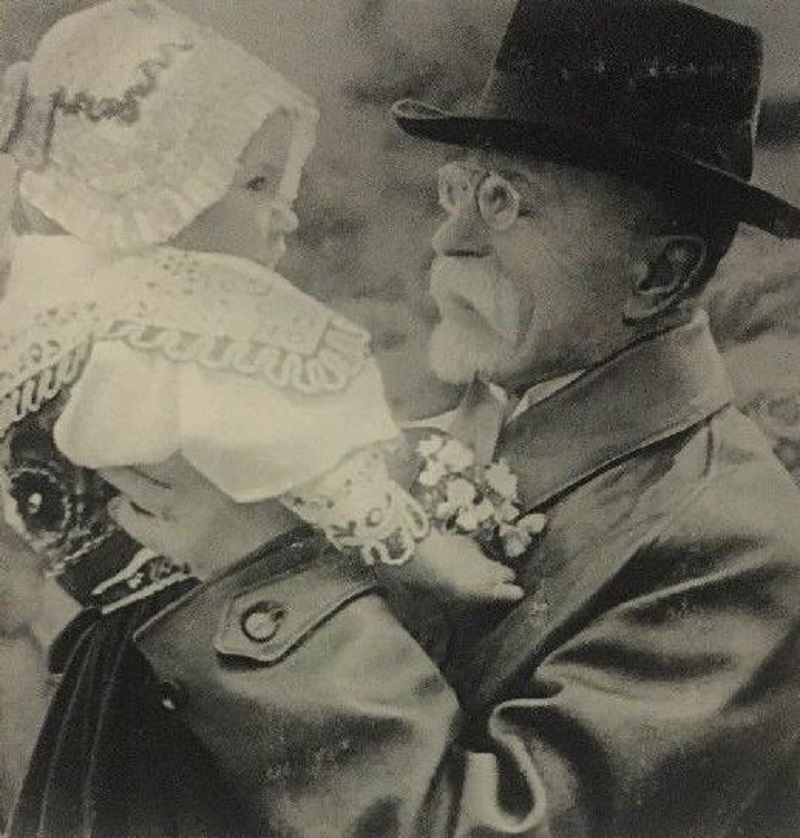
But Masaryk heard the questions of doubters: what is the use of this Czech Brotherhood end religious problem when we have before us tasks of national, economic, and political natures? He would always answer: “Who asserts that economic, political and national questions are not of importance, of great importance? I was in Parliament myself and never thought of talking there about religious questions directly. Chelčický’s Net of Faith cannot repair the port of Holešovice; but neither can the literature of all our liberal representatives and partisans bring nearer the hour of coronation desired by the State Rights Party, I have nothing against politics, against economics, etc., but I am convinced that all these endeavors must have a deeper and homogeneous foundation, and that this foundation was possessed by the leaders of our national awakening. I merely assert that all the present public and in a great measure literary struggling is superficial and therefore ineffectual; I assert that it is also not truly Czech. No respectable person will expound his most sacred convictions every little while at the slightest provocation, but every respectable person has such convictions and lives up to them. Now and then he will have to bear witness to truth expressly, but as a rule he will use his convictions as a guide to his conduct.”
Masaryk’s opinions on the national program, on national work in general and politics in particular, disquieted the contemporaries and leaders of the eighties and nineties of the last century. The Czech Question reads:
“Our political program and in fact also our national program is effectual in so small a degree because it is too abstract, because it does not express the fullness of modern cultural needs. A national program is not formed merely of mottos — which are of course also necessary — but rather of the acquaintance with all the means which under given conditions could fulfill the ultimate aims of national endeavors. It is self-understood that the political parties must proclaim State Rights, to be understood as political independence — their final end.”
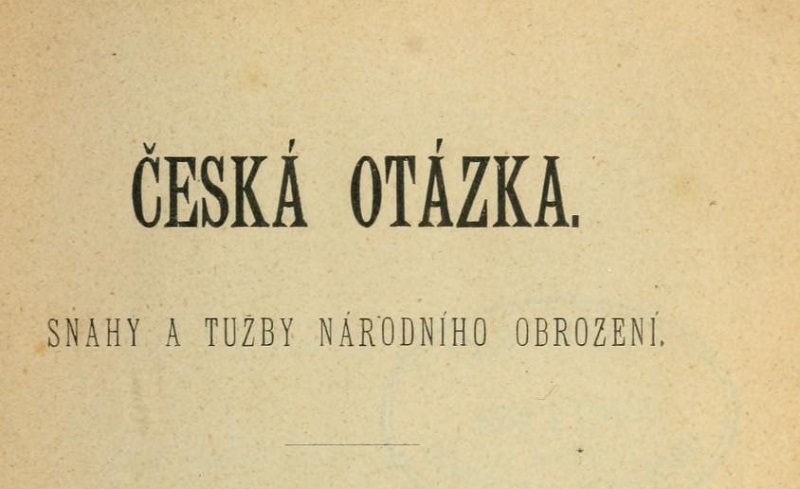
“But what is important is that the proclaimers should be aware of the means leading to this end and that they should not stop with their proclamation but all work indefatigably, each in his own province, for the advancement of his own education and that of others, as Palacký required. Independence will not preserve and save any nation. The nation must preserve its independence, — morality and education will be our salvation; even political independence is only a means to attain the righteous living of the nation – we lost it when we ceased living morally as a nation. In our case even the political party, besides having its narrower program, must stand on the firm foundation of a broad cultural program”.
“The entire attention of our national leaders and journalists was turned to Vienna, all salvation was expected from politics. Such an expectation must be disappointed — was disappointed and will yet be. So much can be done through our work for the improvement of our national life even under the existing constitution that this incessant calling for the help of the state borders on being a sad state of affairs.”
It was upon educational work that Masaryk put greatest stress, as well as upon the enlightened understanding of the nation’s principles and upon enlightened love of country.
The idea of nationality is for an enlightened person a whole cultural program.
If I say, “I am a Czech”, I must have a cultural program. — “As the tendency to national development increases, states become national. Nationality creates slates, or in other words: every nation strives for its own political being, which is necessary even to a small nation . . . We strive for political independence, so that we would not be under a foreign curatorship. Even as the individual wishes to be his own master, so likewise does the nation. The foundation of this striving must be the enlightenment of national self-consciousness.”
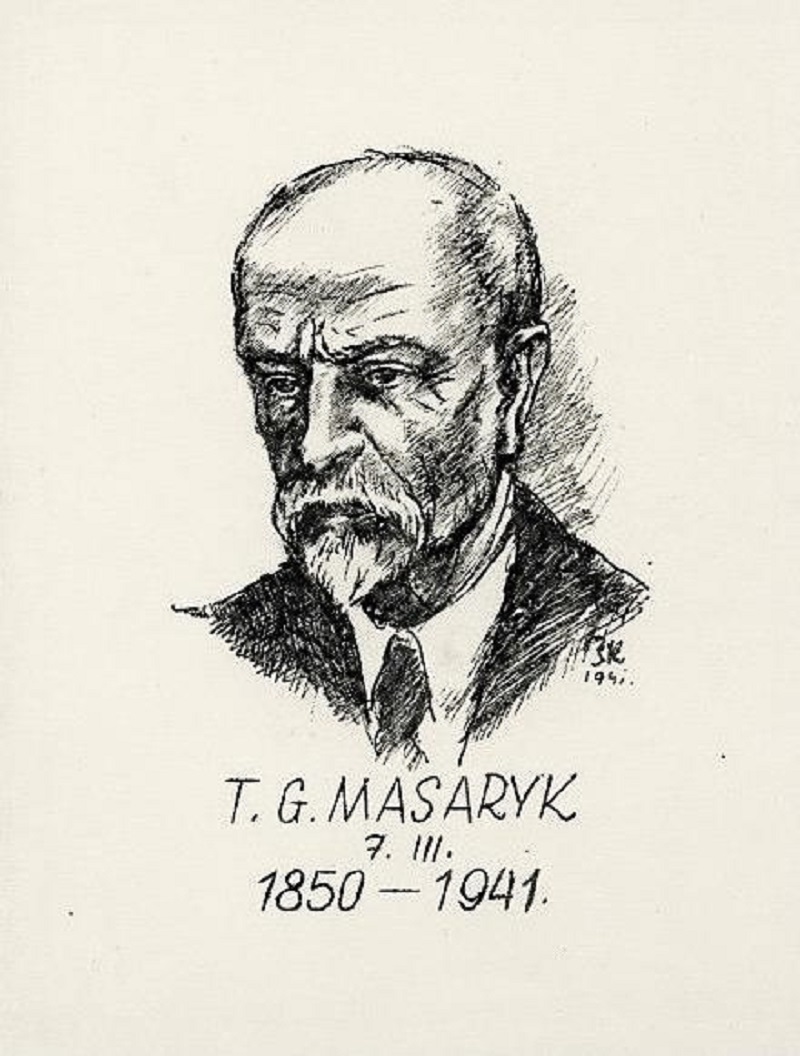
The third life question of our nation is according to Thomas G. Masaryk the social program.
“The social question is not the question of only one class or caste, it is the question of all. The granting of universal suffrage as a concession to the pressure of the laboring class is only a partial and negative solution of the problem; the question mast be solved wholly and positively, and that means to enlighten and to warm the heads and hearts of all, it means to give spirit preponderance over matter, it means to suppress selfishness. The social question is the question of morality or immorality, it is the question of brute force against effective humanity”.
“It is all very well to sing and preach about one’s country, but one must keep to the concrete; for what does a humble Czech see in the poor hovel which to him is his country? What does he know of his Czech fatherland when his children are perishing morally and physically in an insufficient lodging? You must not go to such a person with patriotic phrases; give him a better lodging, and he will have a new horizon, he will have an entirely different national feeling than when he lives in unenvied poverty”.
Ethics do not require only that a teacher be good, but also that he be given what belongs to him by right.
In The Social Question Masaryk transcribed St. Paul’s famous hymn on love into the social language of modern man.
But behold, because Masaryk was a religious man, the reigning church stood up against him. In the Catholic papers he was constantly called a godless individual and a Free Mason, because the church cannot endure anyone who comes with God and Christ and does not come with the Pope and Bishops. Schönborn, the Archbishop of Prague, hastened to the Emporer Franz Josef with the accusation that Masaryk was undermining religion, advocating suicide and seducing the young. He was not successful, but the efforts to remove Masaryk from Prague did not stop; as is well known, three hundred eight priests, gymnasium instructors of religion, brought suit against Masaryk, who came before the law as a disturber of religion. (1910.)
Thomas G. Masaryk was a good pedagogue, worshiped by his students. Notwithstanding, officially the university behaved in an unfriendly manner towards him from the beginning.
Thomas G. Masaryk was not a friend of German philosophy, but was introducing French and English philosophy into Bohemia. He came into conflict with the “national philosopher”, Josef Durdík. The first anonymous accusation of Masaryk was sent to the ministry by an unknown mother who was afraid that he would spoil her son morally, because in Masaryk’s practical philosophy he heard discourses on marriage, and even on prostitution and other evils of modern life.
At the time of the dispute over the genuineness of certain supposedly old Czech manuscripts, Masaryk came into conflict with the whole set of old-world authorities, not always of blameless characters. They denounced him in Vienna. They even expressed their suspicion of Masaryk’s connections with Russia, when twice in succession he undertook trips to Russia for purposes of study and visited Leo Tolstoy. The Austrian ministry only too willingly punished Masaryk disciplinarily and materially. Though at the time of his coming to Prague the government had agreed to make him a definite professor within three years, he did not become one until sixteen years later. His own pupils passed over his head. The worse was he persecuted by the government later, when as a member of a delegation he exposed to Europe the Austro-Hungarian disorders in Bosnia and Herzegovina and when he interceded in the notorious process of Záhřeb, of Friedjung in Vienna and Vasič in Belgrade.
Masaryk was never noisily patriotic, but few did so much thinking about their country and no one of his contemporaries worked so much for the betterment of the nation. And lo, Masaryk was laid hands on most cruelly by the Czech national leaders and rulers. For the first time it happened in 1886, when Masaryk in the name of science demanded that the question of the genuineness of the supposedly old manuscripts of Králové Dvůr and Zelená Hora be decided. The question was a scientific one. But all those old scholars, who were irritated by Masaryk’s directness and honesty, found a much longed-for opportunity to cool their rage on the hard iconoclast.
“Go to the devil, monstrous traitor!” one of our leading papers screamed at Masaryk.
However, it came to be seen that Masaryk would retreat before neither lies nor brute force. His criticism was merciless and annihilating. He did not work with homeopathic doses, but flamed with anger and eloquence. He exalted reason as judge in an educated nation, as opposed to instinct and patriotic tirades, — reason cold but truthful. Of course, a great misunderstanding arose from this. It would be hard to count the wrongs and lies which were hurled at his name: he wrote a treatise against suicide, and was called the Philosopher of Suicide who put a revolver into the hands of the young; he inaugurated his activity at the Czech university with a fight against skepticism and was hissed as a man without ideals, as a nihilist; he asserted himself in Czech public life with an attack on religious indifference, and patriots joined church authorities in declaring him a godless man; as a representative in parliament he opposed Vienna and absolutistic Austria and was hissed as a “kaiserlich und königlich” Austrian; he expounded the philosophy of Czech history and filled the conception of a Czech and a patriot with deep meaning end moral import, nobody went deeper than he to the roots of the Czech question and to the problem of the small nation, — and the idea became current in public opinion that he was a traitor, a cosmopolitan, en internationalist who demanded that the Czech nation cast in its lot with the Germans; and when in 1899 he took a stand against the superstition of ritual murder (among the Jews), defending our honor es en educated nation incapable of such stupidity, it became popular to mouth that Masaryk was defending the Jews (with the implication that it was not done gratis).
Long indeed would be the enumeration of accusations, — but I assert that never was greater wrong inflicted than when this man was hissed as a poisoner of youth, as a person robbing the nation of ideals, as a cold reasoner delighting in his powerful intellect, which with its dry analysis was decomposing national life.
In the year 1890, Dr. Rieger met Masaryk and exclaimed in the private circle of his friends: “What a beautiful man!” Nevertheless, nothing could save Masaryk in the eyes of the powers in sway. The eighties were a time of growing pettiness, weariness, and boredom in general. Such a state of affairs comes to pass in every society whose great expectations have been bitterly disappointed. That notorious period of enthusiasm, the period of conflict between the State Rights Party and passive politics, ended with the capitulation of the representatives and their entrance into parliament. The nation expected paradise and plenty from the Austrian government and was thrown crumbs under the ministers’ table.
In his time of passiveness there was a complete lack of thought, followed by deterioration. At such a time, of course, a man like Masaryk became the general scapegoat, for to stand on a lost bulwark of truth is a dangerous service, as Macaulay says.
“What a beautiful man!”
And nevertheless even Rieger was silenced. From all sides bad influences surrounded him and prevented his drawing nearer to Masaryk. The inordinacy and hate originated in the circle of the learned and passed into the blood of the journalists. These two factors succeeded in defacing Masaryk’s image and filling the Czech public with distrust and suspicion of the doctor who came with new cures and was in the way of the quacks. I bring to memory all of this by way of explanation, not for the joy of it nor for the purpose of reopening closed wounds.
In the year 1900, we took courage to organize a party with Masaryk’s program which received the name of the Progressive Party, later popularly called the Realistic Party. When the daily newspaper Čas (Time) was founded and the Progressive organizations took up work in the country, Masaryk’s name began to acquire a better sound; Masaryk developed a great activity in lecturing in Bohemia and Moravia.
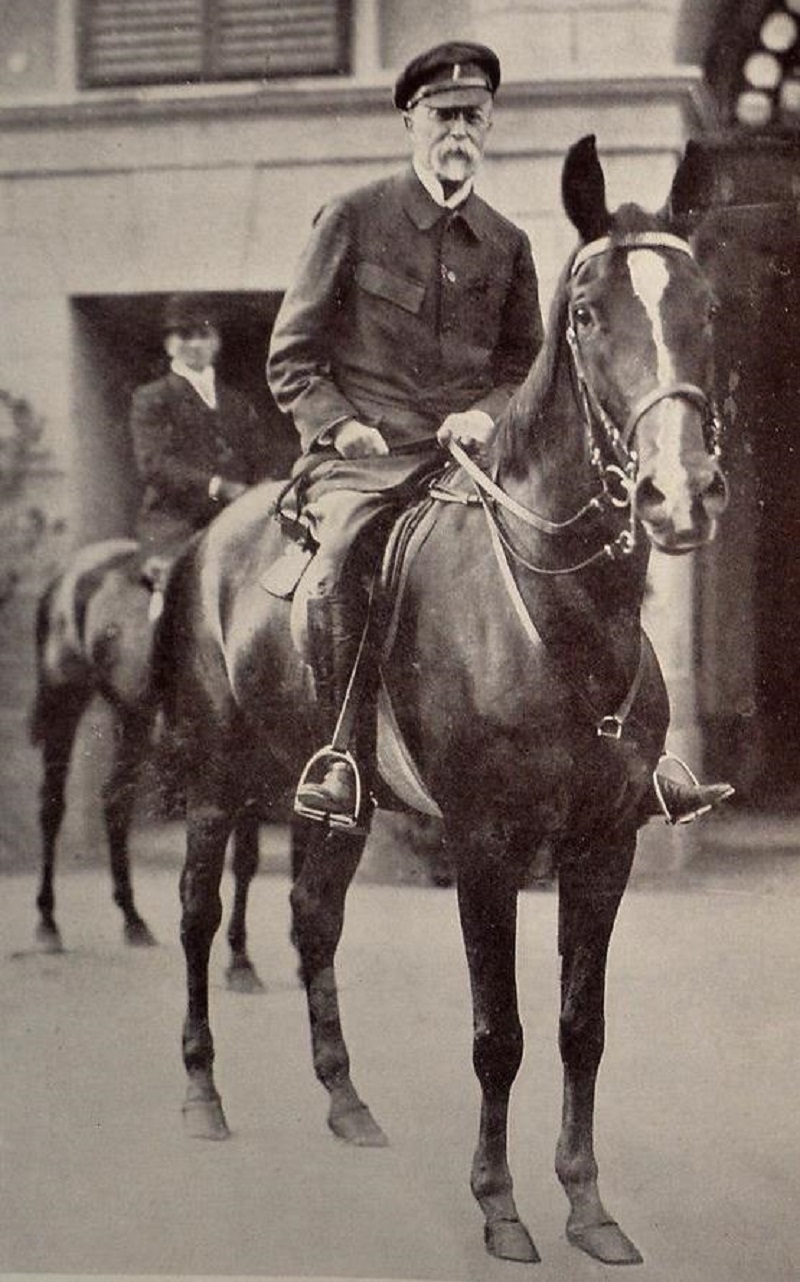
In 1907 and again in 1911 he was elected to parliament by Valašsko, a mountainous part of Moravia. At that time Masaryk called the attention of the foreign world to himself in the three Yugoslav lawsuits which formed a continuous organic whole in that intrigue of Pest and Vienna against the Slavs and especially against the Serbs.
Franz Ferdinand, the heir to the throne, was then bent on throttling Serbia, and was looking for a pretext. Masaryk succeeded in catching the intriguers red-handed, for he proved that Austrian diplomacy, particularly the embassy in Belgrade, had offered false evidence, — Masaryk got possession of the documents and exposed them to the whole of Europe, — and that the Austrian Minister of Foreign Affairs Alois Lexa von Aehrenthal was systematically falsifying the records of the Ministry of Foreign Affairs.
Of Masaryk’s works of this period, — there is a goodly number of them, — the greatest is Russia and Europe, which was published first in the German language: the problem of the Russian revolution, which became a key even to the recent Russian revolution. When in 1914 Masaryk found himself in London and in 1915 was appointed professor in London, we can form an opinion of the attention paid to him in Europe from his reception in London. The British Prime Minister Asquith, being prevented by illness from coming to the inauguration of Masaryk’s lectures, sent this telegram:
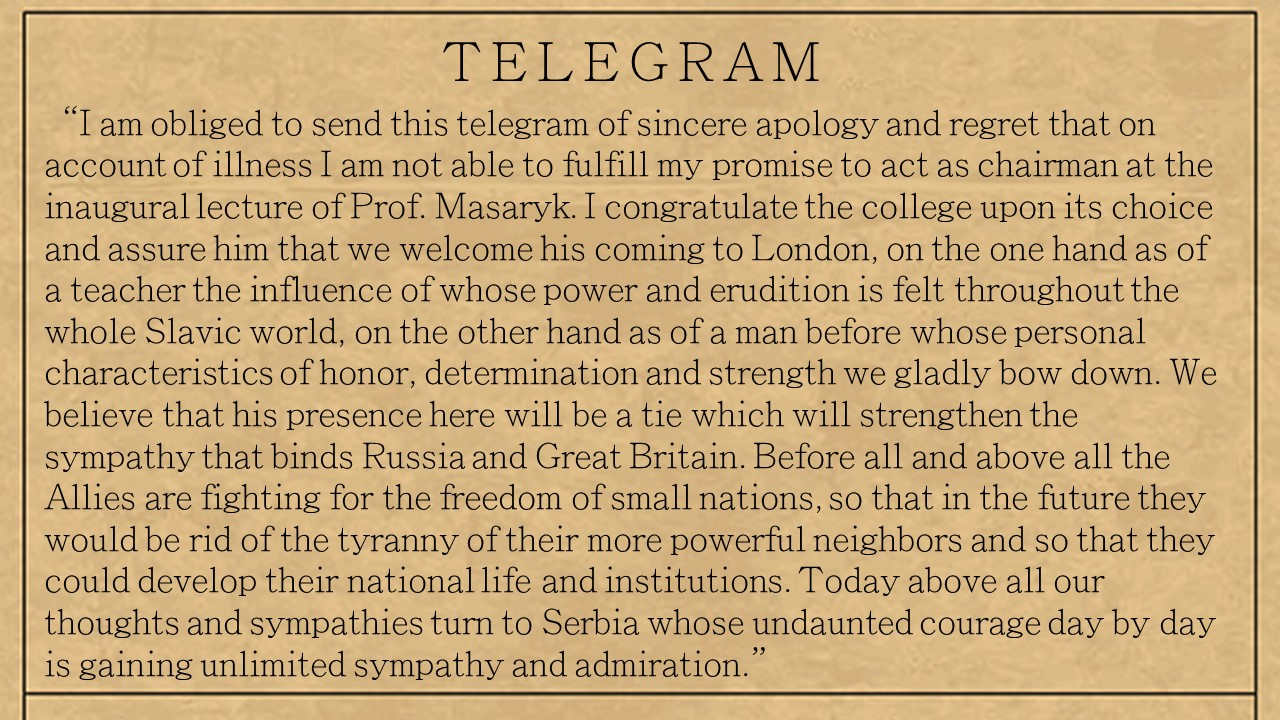
Masaryk did not become embittered and did not retire into private life in spite of his nation’s injustice.
When in the year 1910 we were celebrating his sixtieth birthday and he mentioned an attack made on him, he said with a smile: “After all, it was not so bad in Bohemia. They used to tell me that I am a frightful optimist. Perhaps, — I do not know, — but the fact is that in Bohemia the thoughts of anyone and everyone which are sincere penetrate more rapidly and sharply than perhaps we are ready to admit. I for my own part am contented.”
This man perceived in September 1914, that in the course of the world’s catastrophe the Czech nation must not remain with folded hands, that the Battle of White Mountain could be avenged then or never. The results of his endeavors lie before us: a nation of ten million bows down before Thomas G. Masaryk’s work.
Whether or not he ever stifled the enthusiasm and cooled the patriotism of Czech youth is answered by the Czech legions in Russia, in Italy, in France and among the Serbs, for these legions are Masaryk’s work and the legionaries revere him as a father. There was no fitter man among us to bring about our nation’s change of fortune. Masaryk introduced himself as the spokesman of our nation to the leaders of the Entente, and they saw a Czech with a wide horizon, with keen sense, a Czech mastering the world’s problems. And that Czech was a man of terrible energy, who in spite of his age did not hesitate to travel over three continents in order to awaken interest in the fate of a martyred nation.
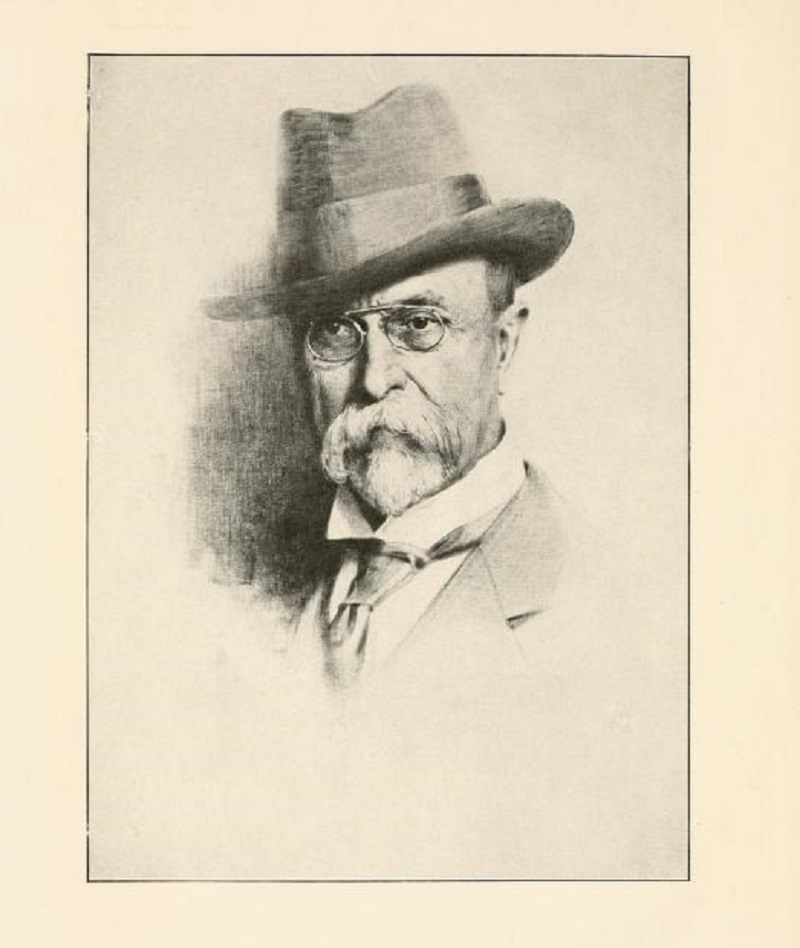
Masaryk returns from exile as the president of the Czech Republic. The son of a coachman has come to the Czech throne, vacated by the deposition of the Habsburg dynasty. Masaryk is a man of work, he does not ask for celebrations. He surely did not come to bring inactivity, rest, and indulgence. He will goad us on to work because a great deal is expected from the Czech nation. Masaryk’s work among us will continue to be the work of a builder. For we know now finally that T. G. Masaryk from the very beginning was a formative spirit, a builder, a creator. Unrightly was he looked upon as an iconoclast.
Every builder who constructs a new building must pull down the old and decayed, and clear away the refuse. And it was upon this phase of his activity that rested the shortsighted and sometimes malignant eyes of those who did not perceive the building. However, from the time of the manuscript conflict, his greater works as they follow one another and also his smaller articles all create new values and positive truths, full of life and freshness. He penetrated to the cause of the tendency to suicide in modern society and offers a cure in religion; he understood the skepticism of the people of today, but tendered objections to Hume; he removed the fictitious poetic halo from Czech history and replaced it with indisputable reality — with Hus and the reformation; had he given nothing more to the nation than the thoughts embraced in The Czech Question, in Havlíček and in The Social Question: we should have to admit that he gave every enlightened Czech a guide, and furnished principles and methods for ail the national needs that the future may bring or that the present has already brought: the principles of truth and progress, which are the foundation of all that is Czech, and the realistic method, which goes to the root of matters and is not satisfied with daydreams.
There was one party which always honored Thomas G. Masaryk as a great idealist and creative spirit and national pedagogue. Masaryk has ceased to be the leader of one party, for the whole nation called him to be its leader at the dawn of the new liberty. Masaryk’s work is already beginning to bear fruit. That work is nothing else than continuing the traditions of our past, of the time of the Hussites and the Brotherhood, which were interrupted by both the victors on the White Mountain: Rome and Vienna.
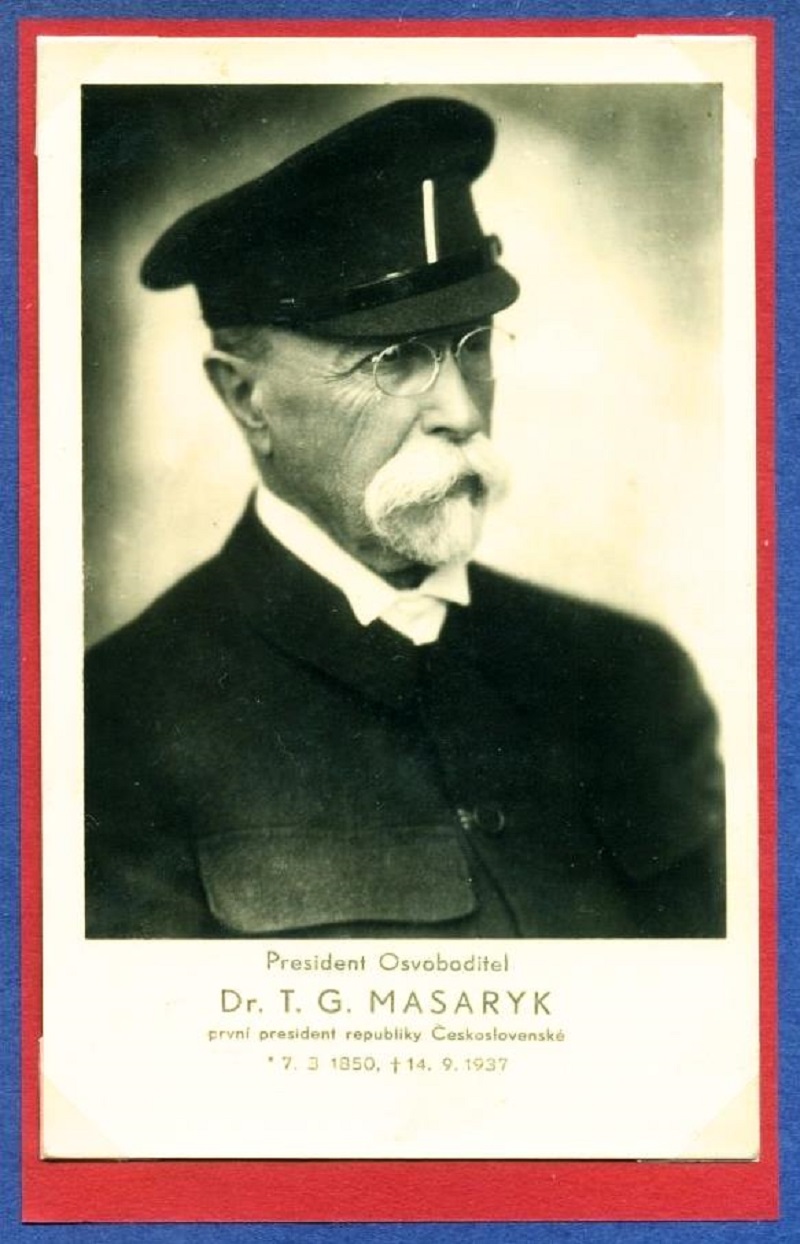
I believe that all will be well with the nation if it follows its leader. I am sure that we shall not lose our way if we follow him. It must be clear to us that not the leader alone, but the united efforts of a nation of ten million souls will create and insure our future.
– end –
Interesting reading, even for today… perhaps especially for today, 99 years later.
If you have not already subscribed to get TresBohemes.com delivered to your inbox, please use the form below now so you never miss another post.
Remember, we rely solely on your donations to keep the project going.
Become a friend and get our lovely Czech postcard pack.


